#but it implicate Alan in his attempted control over the story and reality
Explore tagged Tumblr posts
Text




“Darkness flowed from Cauldron Lake. Gaze into the black mirror of the lake, you'd see it all around you, and you'd understand, it was already out, already where you were. It was already too late.”
— Alan Wake 2
#alan wake 2#saga anderson#alex casey#aw2photography#i looove a good ‘it’s not a lake it’s an ocean’#evil water ! evil water ! evil water !#spoilers for the time breaker ep of the dlc -> Gotta love when a story pulls the ‘it’s too late’ for characters#realizing that all along you had no chance#I do find it interesting to think about *how* much is just the power of the lake vs Alan’s writing (and his own mind influenced by it)#the story very purposefully doesn’t give outright answers to everything#but it implicate Alan in his attempted control over the story and reality#☝️🤓 stopping myself before I’m writing a whole post in my own tags#*implicates
117 notes
·
View notes
Photo

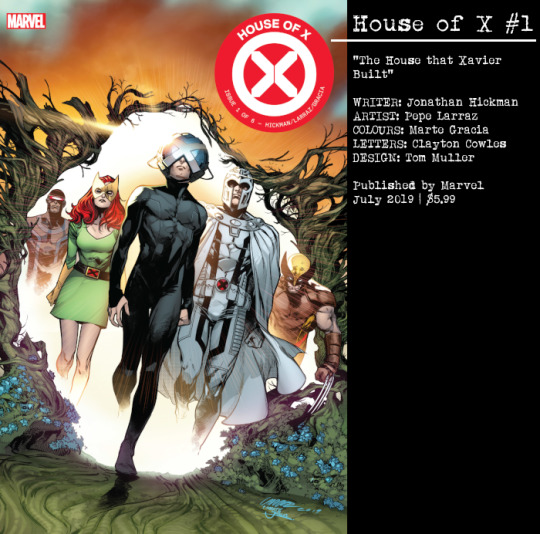
For the past few years, you could argue that the X-Men franchise has been working on trying to rediscover its identity. Since reality reasserted itself coming out of the Secret Wars event, they’ve been in a kind of flux. The initial relaunch set up the mutants in opposition to the ascendant Inhumans. When that was brought to a head, Marvel’s merry mutants then redefined themselves in part through nostalgic “back to basics”. In the past year and a bit, the mutants through a series of endings in “Disassembled” and Uncanny X-Men, while the Age of X-Man event traumatized them in a loveless utopia. It’s been an interesting ride.
You don’t really need to know any of that, or anything at all of recent or past history of the X-Men, in order to jump into House of X #1. This hits the reset button on the franchise and, while I expect that the past will inform some elements, it can largely be enjoyed coming in blind.
This is arguably the largest, most dramatic change to the X-Men since Grant Morrison, Frank Quitely, Tim Townsend, Brian Haberlin, and Comicraft took over back in New X-Men #114. Jonathan Hickman, Pepe Larraz, Marte Gracia, Clayton Cowles, and Tom Muller kick off a new era that is firmly built on a science fiction grounding. It frames the mutant identity in a new understanding and begins a new conflict with the rest of humanity as human governments and organizations react to the new status quo.
Without going into any details in this section, I can say that House of X #1 takes many of the common themes and elements of decades of X-Men stories and gives them a new spin, both familiar and strange at the same time. All of it is brought beautifully to life through astounding artwork from Larraz and Gracia, taking it to a completely different level. It’s brought together nicely through the design work of Muller, implementing a number of text pieces yielding further information, making it decidedly feel like a Hickman comic.
The digital edition on Comixology is also another instance of having “Director’s Cut” material, including Hickman’s redacted script for the issue, a wide array of the variant covers, and process pages of line art and coloured pages.
It’s a bold new era starting point for the X-Men and I’m excited to see what else is in store.
There will be spoilers below this image. If you do not want to be spoiled on House of X #1, do not read further.
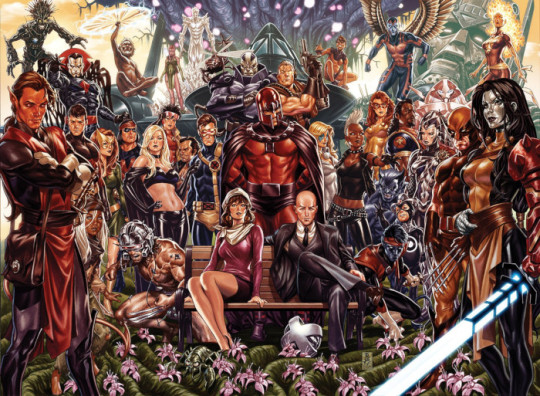
SPOILER WARNING: Below I’ll be discussing the events, themes, and possibility of what’s going on in House of X #1 and beyond. There are HEAVY SPOILERS beyond this point. If you haven’t read the issue yet and don’t want to be spoiled, please stop reading now. You’ve been warned.
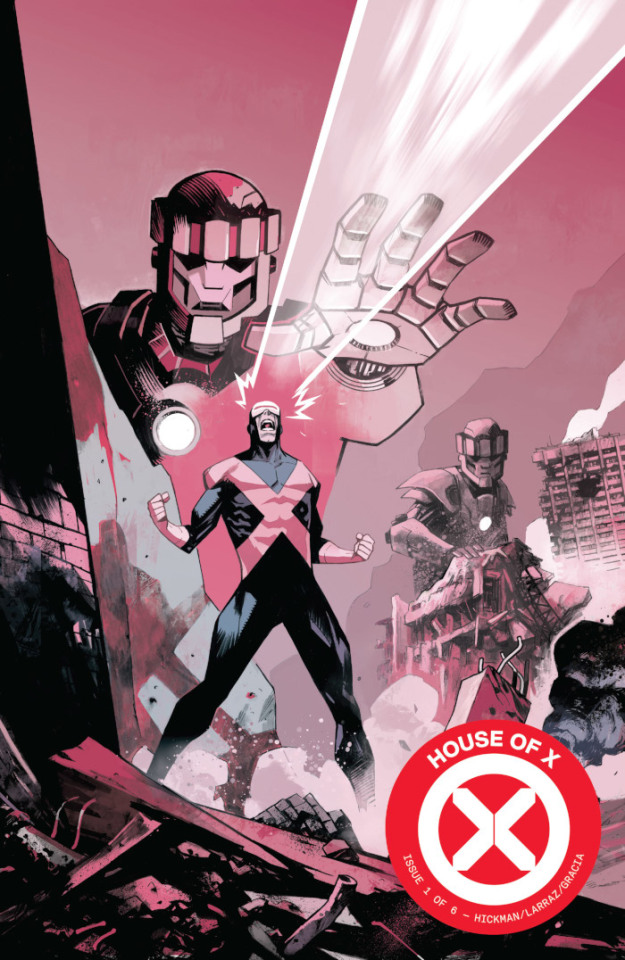
PREAMBLE | First Impressions
I had high expectations for House of X #1.
Jonathan Hickman is easily one of my favourite writers currently working in comics. He’s full of mad ideas that you look at and wonder why no one has implemented them in quite the same arrangement before. He’s great at execution and construction for the long game. While each story usually works on a micro individual story-arc/issue level, they also build a large tapestry that tells an even larger tale. One merely needs to look at his previous outing for Marvel telling one grand story that began in Dark Reign: Fantastic Four (with elements you could say were seeded even in Secret Warriors) and ended in Secret Wars. It was wonderful.
Pepe Larraz has been wowing me with his art since Uncanny Avengers. There’s a fluidity of motion and design that evokes the spirit of Alan Davis, Neal Adams, and Bryan Hitch, while adding what feels like an even more gargantuan attention to detail and sense of design. He elevated that even further with stellar showings on Avengers: No Surrender and Extermination. He’s easily become one of Marvel’s premiere artists to me.
When you combine Hickman and Larraz, and couple it with a marketing machine hyping this as the next big thing in the X-Men evolution, expectations were huge.
House of X #1 exceeded those expectations.
This first issue feels like a sea change for the X-Men, in terms of the team’s status quo and in the approach to storytelling. This is a science fiction story with heavy political leanings. With Xavier pushing the lead, Marvel’s mutants have staked a claim on a new mutant nation on Krakoa, with tendrils through Earth and beyond.
And it’s breathtaking. The artwork from Larraz and Marte Gracia is beautiful. The landscapes and vistas, the designs for the characters, the page layouts, and more, this is a visually stunning book. Larraz has truly outdone himself with the line art, but it’s taken even higher by the sheer beauty in Gracia’s colours. It’s very rich, emphasizing the beauty and wonder of this new world being birthed into existence.
There’s also an interesting choice here in Clayton Cowles’ letters, it’s mixed case. These days it’s not necessarily as unusual not to be in ALL CAPS, but it is different from what we’ve seen in Uncanny X-Men as of late and helps to foster that idea of this being something different. Similarly the text pages scattered throughout from Hickman and Muller that give this the stylistic feel of a Hickman comic and enriches the depth of this new world with more information.
ONE | X Nation
The idea of a mutant nation isn’t a new one. Magneto broached it before and attempted a kind of compound with Asteroid M. Genosha was set up as a mutant paradise for a while. The fallen remnants of Asteroid M served as the X-Men’s home repurposed as Utopia. A corner of Limbo was briefly carved out as a haven for mutants. There was that enclave with Xorn. And Jean Grey kind of set up mutantkind as an amorphous nation within nations given central home in Atlantis during X-Men Red.
More often than not the nation merely serves as a backdrop for the X-Men’s interactions in the rest of the world. I mean, when mutants had their own homeland in Utopia, more stories took place in San Francisco even before the schism that drove half of them off to the Jean Grey School of Higher Learning in New York.
What’s presented in House of X #1 feels different.

Ostensibly, the new mutant nation is headquartered on Krakoa itself, but the implication is that it’s so much broader. The X-Men have seeded Krakoa flowers all over the Earth, on the Moon, and Mars and have grown what feel like embassies and external outposts of the fledgling mutant nation. And it’s the fact that these outposts are within other nations, with the potential of moving a superpowered army unseen and seemingly instantaneously, that has the government representatives met this issue nervous.
While it is a home and a haven for mutantkind, it’s also actively being treated as a political entity. Similar to how Jean argued her case for mutantkind in X-Men: Red, we’ve got ambassadors of sorts checking in with Magneto and two of the Stepford Cuckoos. There are some intrigue elements that sync up with other aspects of the story, but the fact that it’s being used as a tour, a show of force, and an ultimate in order to broker a deal recognizing Krakoa as a nation is an interesting development. It takes it from a place of superheroes playacting at being politicians to actually being politicians. Abrupt as it may be to have Magneto as the face of the operation.

But that’s part of the genius of this play. Like with Magneto siding with Scott upon the founding of Utopia, Xavier and Krakoa is a further fulfillment of Magneto’s dream. A mutant homeland with mutants in control. Every previous time this has happened it’s come to ruin, but it’s always fun while it lasts.
Also, it’s an impressive show of power to have Magneto as the liaison to the rest of humanity. Where Kitty Pryde or Jean Grey would likely be more diplomatic, that isn’t the intent here. Sending out not only one of the most powerful mutants as your face, but also someone who has been in direct conflict with humanity over the years, pushing a mutant independence angle, is a statement that the new mutant nation isn’t something to be trifled with.
TWO | Who are these X-Men?
With the release of titles, creative teams, and team line-ups for the forthcoming “Dawn of X” reboot following House of X and Powers of X, there have been a lot of questions about what’s going on. Characters who have died during recent issues of Uncanny X-Men are alive and well. Characters who were in different configurations and statuses seem to have been changed to more familiar versions and attitudes. So it raises the question for House of X, who are these X-Men?
This first issue doesn’t answer that. I don’t know if we’re going to get an explicit answer that, but I think we’re given a clue on the very first page.
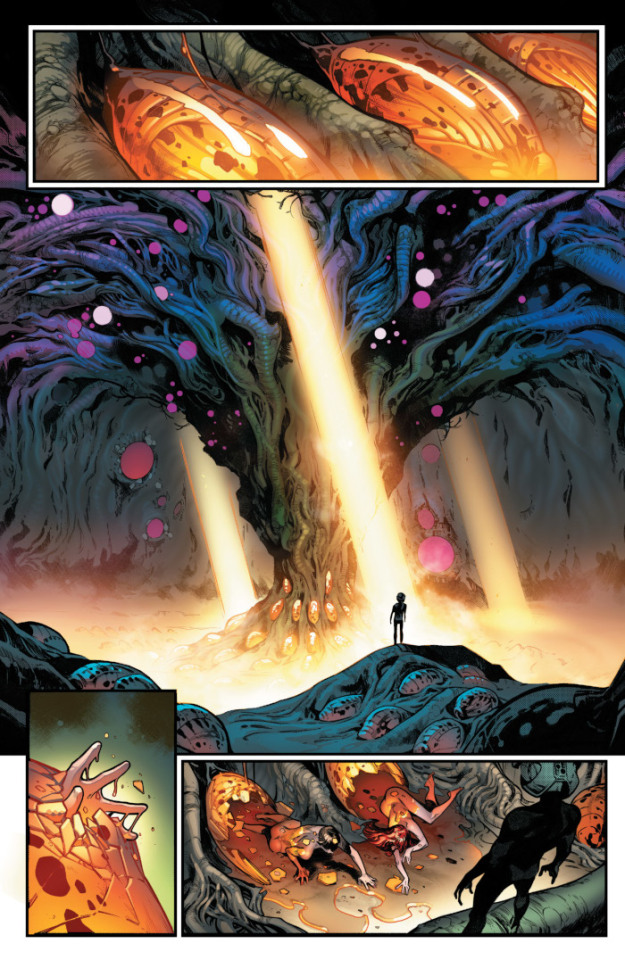
A key element in this first issue is the utilization of the mutant island Krakoa, both as a new home for the X-Men and as refined and adapted through application as portals, habitats, and medications. But in the opening scene, we see a central tree essentially acting as a birthing matrix overseen by Xavier.
The first born being Jean and Scott, I’d guess, then maybe that’s Bobby on the second page with some others. It’s possible that the one guy is even Gabriel Summers. It could be that they’re being rejuvenated, refreshed, and refined through healing properties heretofore unrevealed of Krakoa, but it may be more sinister. There’s a reaching, a yearning towards Xavier that makes me suspect. Are they the characters that we know? Or are they something else? I don’t even know if that’s a question we’re supposed to be asking.

Other than Magneto working front and centre with the team, they’re also working with a number of other traditional villains/antagonists like Sabretooth, Mystique, and Toad. All three have had their dalliances back and forth between the sides of good and evil, but it’s interesting to see them in the fold here. One the one hand, it reinforces the idea that this initiative of Xavier’s is for all mutants and that they’ve come together. But it also raises the question further, how?
I think it’s worth noting that every X-Men character we see fully interacting in the real world has been a villain at one point. Cyclops included, since the last time the world at large saw him before his resurrection he was “Mutant Terrorist Most Wanted #1″.
With characters seemingly back from the dead, characters changed to different versions, characters rejuvenated and healed as it appears that both Cyclops and Banshee are, characters who’ve previously been at one another’s throats, there’s a lingering doubt of how Xavier achieved this. There’s also a happy Wolverine playing with kids, so just think on that for a bit.
THREE | Master of Puppets

Professor Charles Xavier died (again, but who’s keeping track?) during Avengers vs. X-Men back in 2012. Then was brought back in Astonishing X-Men, first as a disembodied psyche caught in the Shadow King’s web and then through the personality sacrifice of Fantomex, inhabiting his body. He referred to himself as “X”, as something new, despite repeatedly claiming that he is the one, true Charles Xavier. His actions, both in his initial appearances and in the subsequent Astonishing X-Men Annual wherein he reunited with the remaining original five X-Men (Cyclops was dead at this point), could be considered manipulative, possibly even evil, callous, and villainous. We’ve not seen him again until now.
With the uncertainty of the origins of the wide cast of characters on the team, whether or not they really are our X-Men we know and love, doubt is cast on Charles Xavier as well. And it’s not just because we only see part of his face. Larraz’s design for Xavier’s new large, portable Cerebro deliberately distances us from him. It’s alien and off-putting, and I believe that’s the idea. I’m unsure whether or not this was the intention, but it also evokes the memory of another villain that Hickman enjoyed using, The Maker. The visual similarities and implication of another hero turned villain can’t be missed.
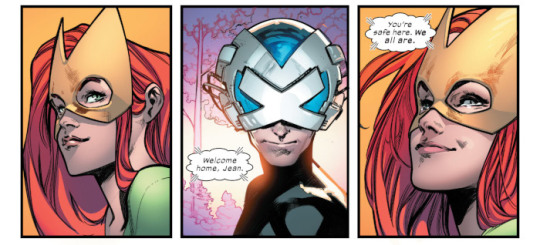
Consistent with that idea is the portrayal of Jean here. From a real life perspective, there’s an argument that all of the X-Men in House of X and beyond are taking on the costumes and behaviours of their most popular incarnations. In that regard, it would kind of make more sense that Jean would be in a more Phoenix-inspired get up or something similar to her blue and yellow outfit from the ‘90s.
Instead, we get Marvel Girl. Which seems odd to me. It’s not only regressive, but it represents a time period that in-canon Jean supposedly hates. It was, however, a time where Xavier’s somewhat lustful intentions towards his student were more apparent (creepy and disturbing as they are). It further reinforces that maybe not everything is on the level with what’s going on.
FOUR | A New Religion

Religious symbolism and outright textual substance are rife throughout this issue. From the beginning of Xavier acting as a kind of god to the newly reborn mutants beneath a Tree of Life through to Magneto’s proclamation at the end of the story, this first issue is planting the seeds of a new mythology for mutantkind. It’s something that sets them apart from the rest of the superheroes on Earth, giving them an explicit framing as the overseers of the world, but with it, there’s a tie back to how this new nation feels different.
There’s a definitive feeling from House of X #1 of building an entire society. Religion as an aspect of that, both real and implied, but we also get a new language of Krakoan (the glyphs we’ve seen before and again in this issue) and the idea of a broader organizational structure to Krakoa. It’s not just a school any more.
FIVE | Dangerous Beauty
There’s an interesting dichotomy set up in this first issue as well between the mutants and humanity. Of nature versus technology. It’s one we’ve seen before in mutants being the natural evolution of mankind coming into conflict with the sentinels constructed in order to prolong mankind’s grip on power. It tends to lead to the kind of nightmare scenarios of post-apocalyptic futures as we see in Days of Future Past.
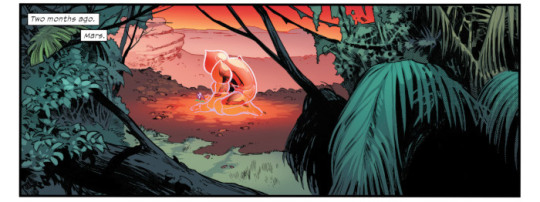
Krakoa is an inspired choice for the catalyst of mutant change in the world, delving into some of what was explored in Wolverine and the X-Men, but going steps even further. Creating pharmaceuticals, creating properties similar to Man-Thing’s ability to transport throughout the world, and the various habitats. It’s like the Weapon Plus application of The World in that everything is grown, organic, nature-based objects all ostensibly pieces of the greater Krakoa entity. I wonder if this gives Xavier and the X-Men effective “eyes” all over the world?
It’s also important to recall how dangerous Krakoa has been throughout X-Men history, acting as an antagonist that kickstarted the all-new, all-different era in Giant Size X-Men #1, built out even in Deadly Genesis with the lost team, and the problems had at the Jean Grey School with the baby Krakoa.
And then there’s the flip side.
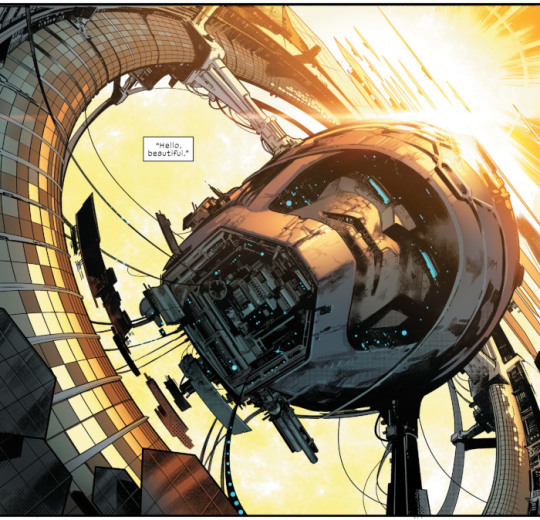
Orchis is a new organization introduced here comprised of a number of former agents of Marvel’s intelligence community, good and bad, ranging from SHIELD to AIM. And we’re brought aboard the Forge. There’s a fearful symmetry to it, a station close to the Sun building machines to counteract whatever it is that Xavier is ultimately doing. At the Forge’s heart what appears to be a new kind of Master Mold sentinel, decked out in some of the same colour schemes that we recently saw with the golden sentinels of ONE in Uncanny X-Men.
I can only imagine that this is going to wind up well.
We’re shown a face that we’ve not seen for a while (outside of solicitation covers), since I thought she was an “ordinary” human again, in Karima Shapandar. It’s kind of sad, though, as her Omega Sentinel protocols seem to have been reactivated.
SIX | We Can Be Heroes
The presence of the X-Men within the broader Marvel Universe framework can be problematic at times. It’s one of the reasons why they’ve often been shuffled off to parts unknown, set up as a rag tag band of fugitives, and limited in number to the point where they’re culturally, socially, and politically insignificant. Because the heart of mutant existence within the Marvel Universe is one of intolerance.
Mutants are feared and hated, hunted down, enslaved, or executed. While it works extremely well as an analogy for real life racial and sexual bigotry and prejudices, it takes on a different level of problem in the face of a world filled with superheroes. For superpowered people who aren’t mutants, you wonder about a couple of things, such as why the general populace even makes a difference and why non-mutant heroes don’t seem to care about mutant prejudice.
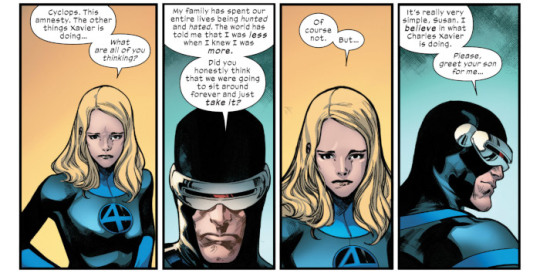
That latter one has been approached a few times previously, as recently as this latest volume of Uncanny X-Men, and it always seems strange. It’s like the question that you see raised in Swamp Thing and Marvelman and later The Authority of the realistic application of near limitless god-like powers as a force for change; if you’ve got these powers, why don’t you do something to change the world’s ills?
It really undercuts the heroism of teams like the Avengers and the Fantastic Four, because it eliminates them as defenders of a universal justice, but merely teams that fight for the status quo. And so eventually the X-Men get shuffled off to Chandilar.
I think it’s great that House of X #1 goes straight for that jugular. Cyclops’ confrontation with the Fantastic Four beautifully displays his integration and friendliness towards the other heroes, that he’s happy for Ben’s wedding, but still at odds with them when it comes to overall mutant rights. Including those of Sabretooth, who admittedly just robbed a place and probably killed a few dozen people. So, it’s not like the Fantastic Four are in the wrong in trying to apprehend Sabretooth, but it’s reinforcing bits of the laws of the state versus possible ethical or moral concerns.
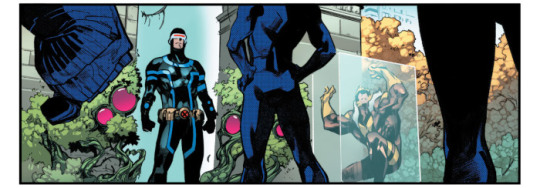
This scene also reminds us that mutants are everywhere. They can be anyone within society, anyone’s husband, wife, mother, father, friend, daughter, family, neighbour...anyone’s son, including Franklin Richards, son to Reed and Sue. It helps underline that compassion, understanding, and fighting for what’s morally right is something that really should be at the forefront here. And that Cyclops and the rest of Xavier’s new nation of Krakoa are making it known that they’re not going to accept the intolerance any more.
It’s also interesting the incorporation of the broader Marvel Universe as a catalyst for this confrontation in that Sabretooth, Mystique, and Toad were stealing information from Damage Control. It’s a neat bit of the shared universe and presents something potentially nefarious about Damage Control appropriating broken Stark and Richards tech. Though, we are left wondering, what did they steal?
SEVEN | Nothing As It Seems
One of the central themes we’re presented with in the ambassadors’ tour through Krakoa as led by Magneto is that nothing is quite as it seems. It’s even mentioned explicitly through the dialogue when the ambassadors are discussing the deal as lain out by Xavier. Worrying about the drugs, but even more about the amnesty. The terms of the amnesty aren’t actually stated here, but the gist seems to be that all mutants, criminal or otherwise, need to be set free (and presumably allowed passage to one of the gateways to Krakoa), if the country is to take part in the life-saving drug aspect.
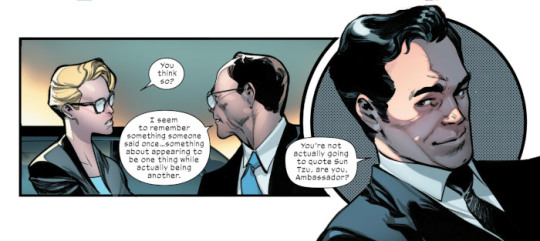
Now, there’s an in-story payoff to the ambassadors statement, in that they’re all plants of one form or another, working for different organizations in order to gain information or surveillance on one thing or another and in Magneto’s ulterior motive for gathering them, but it feeds back into that tingling suspicion from the first page.
Something feels off. Something feels wrong. But that could well be the point. The seeds of doubt may well be planted intentionally for Xavier’s plan and the appearances of the characters. It could well be that we’re supposed to think that something hinky is going on, just to keep us in suspense. And that everything we’re seeing, everything we’re being told, really is the truth.
CONCLUSION | A More Perfect Union
As I said previously, House of X #1 exceeded my expectations.
Hickman, Larraz, Gracia, Cowles, and Muller came together to produce what is one of the most exciting and intriguing first issues that I’ve read in a very long time. Every single element from dialogue to line art, colour to letters, to cover to design gels into one massive stroke of storytelling. Every single thing within the comic adds another layer to immerse yourself into this brave new world of mutant merriment.
This is an incredible start to this new era and I am very excited to see what comes next week in Powers of X #1. Especially in how it relates back to House of X #1. These issues are apparently meant to be paired, but how exactly remains to be seen. I find that interesting, since PoX is apparently set in a different time frame.

d. emerson eddy is not an island.
14 notes
·
View notes
Text
7 Powerful Books That Will Unleash The Hidden Potential Of Your Mind

" A mind needs books as a sword needs a whetstone, if it is to maintain its side."
There it is: your mind -all leashed-up, bored, bookless and chasing its very own tail in the edge. It's time to unleash it. It's time to throw it back into the surprising waters of wonder and admiration. It's time to sidetrack it from the all as well familiar tail (or story, to wit), as well as give it a juicy carrot to chase around rather. Seven juicy carrots, to be exact.
So, shop that leash, open up your mind, snuggle with your ideal close friend, and dive precisely into the complying with mind-unleashing publications. However keep the light on. As Groucho Marx wittily believed, " Beyond a pet dog, a publication is guy's best buddy. Within a pet dog it's too dark to check out."
1.) "The Beginning of Infinity" by David Deutsche
" We never ever recognize any type of information prior to translating it via concepts. All monitorings are, as Popper put it, theory-laden, and thus imperfect, as all our concepts are."
From epistemology and also quantum fungibility to ecological values and societal advancement, David Deutsche takes us on a provocative trip right into addressing a single inquiry: Is there a restriction to exactly what can be comprehended? He comes at a mind-expending solution of “no” by diving deep into the broadening waters of epistemology and also ontology. He profoundly claims that our understanding of anything is constantly at the “beginning of infinity” and also there will certainly constantly be a boundless amount a lot more left for us to recognize. Basically speculating that, with exact and versatile understanding, anything is feasible unless it is restricted by the laws of physics.

Highly sensible as well as integrating, The beginning of Infinity releases us into greater thinking on the path towards much better and also far better descriptions. He takes us from parochial, obsolete methods of believing to the idea of universality and upgraded ways of thinking of the cosmos as a thing to be gradually evolved right into making use of ever-expanding modern technologies. Therefore bridging the void from guy to overman. As he explained, "There is just one method of believing that is qualified of making progress, or of enduring over time, as well as that is the means of seeking great descriptions with creativity and also objection."
2.) ' Circulation: The Psychology of Optimal Experience' by Mihaly Csikszentmihalyi
" The majority of satisfying activities are not all-natural, they demand an effort that initially one is unwilling to make. Once the communication begins to offer feedback to the person's abilities, it typically begins to be intrinsically rewarding."
Thanks to Csikszentmihalyi, the concept of the “flow state” has come to be an essential aspect of our social awakening. The optimum experience is gained through deep self-control in a particular field/art/sport that gives inherent reward, difficulty, and also comments, therefore integrating self-confidence, focus, control, flexibility, and also connectivity. Time stops or decreases. Instabilities go away. We quit respecting what others consider us. A creative unraveling of something bigger shows up. Every little thing flows easily in interconnected unison with us as its synergistic spearhead. In brief: we stop believing and also simply do.
By just asking the concern, " When are people most pleased?" Csikszentmihalyi, with time checked study, identifies flow states as the response. Professional athletes call it "remaining in the area," mystics have actually defined it as “ecstasy,” and artists term it “rapture.” Releasing ideal experience is concerning doing what we enjoy as a pathway toward better meaning, happiness, and also a self of higher intricacy. By doing just what we love in challenging ways, we take advantage of ideal experience right into our lives. This book powerfully discusses the psychology of this important process.
3.) "Phi: A Trip from the Mind to the Soul' by Giulio Tononi
" Dirty ideas, like dirty waters, can serve 2 objectives only: to hide what lies beneath, which is our ignorance, or to earn the shallow appear deep"
Phi takes the viewers on a mind-altering trip through the nature of consciousness. It interweaves scientific research, art, as well as the imagination with golden proportions, Fibonacci series, as well as fractal cosmology. The visitor has the happiness of viewing the world through such masters as Galileo, Alan Turing, Darwin and Francis Crick, amongst others. From neuroscience to pseudoscience, from deep introspection to mindful meditation, Tononi illuminates on exactly how awareness is a progressing, ever-deepening recognition of ourselves as finite, souls in a limitless universe.
We find out just how awareness is integrated information and just how the power of that combination requires miraculous duty and also credulity. It instructs exactly how the brain is the seat of our understandings, as well as is an innovative force par quality, as well as can also create brand-new forms and also brand-new qualia. It shows just how, by growing awareness, deep space comes increasingly more into being, and synthesizes the one and the many, the ego as well as the eco, the individual and the interdependence of all points into a linked force of Nature.
4.) "The Art of Fear" by Kristen Ulmer
"" Every little thing is great" is really a copout, a stuck area, an obstruction to the exploration of who and just what you are broadening right into higher and even more, as well as the advancement of humankind."
The Art of fear has to do with curiously accepting fear rather compared to conquering or repressing it. It has to do with restoring our understanding of fear from scratch. It has to do with realizing that Anxiety is just one of 10,000 employees at You Integrated, as well as how they all require a voice. Yet Fear many of all, lest all voices become quelched darkness. The key to fear, she discusses, is wondering regarding it, consequently utilizing its power rather compared to overcoming it. In between guts and curiosity is whatever we should be fearless.
Ulmer's individual trip with anxiety at some point led her to examine with Zen masters, where she discovered a mindfulness device called "Shift" which moves our perspective of worry from oblivious repression to aggressive curiosity, thus aligning it authentically with our real nature. The standard tenet being this: As opposed to quelching fear, equip it, by being curious as well as examining instead of judgmental and implicating. Honor it with deep respect so it does not operate secretly in twisted means below the surface.
5.) "Endgame: The Problem of Human being' by Derrick Jensen
" Property One: People is not and could never ever be sustainable. This is specifically real for commercial civilization."
Endgame will certainly take every little thing you think you understand about being a social remaining in an apparently useful society as well as turn it on its head. Absolutely except the regular statist, neither the faithful obedient resident. Endgame has to do with the vital demand to right away take apart the unhealthy human being that surrounds us. Endgame is a scathing, surging review against the harmful, unsustainable, and also ecologically unhealthy man-machine that is our contemporary culture.
Breaking guide down right into a series of easy yet increasingly intriguing facilities, Jensen takes us on a psychedelic as well as convincing flight into the undesirable stubborn belly of the fierce, ecocidal beast that is modern human being. His standard property is straightforward: Industrial people is unsustainable. It's not an inquiry of “if” but a question of “when” it's going to fail.
He suggests that the longer it takes people to fall, the worse the tragedy will be. In that light, there are 2 points we must be doing: Causing the autumn sooner rather than later, and preparing to endure it. His attitude is caustic as well as not so serious, however all the better for the shock worth it offers. This book actually squashes the box we're all so desperately attempting to assume beyond. A free (and maybe less hostile) read is Beyond Human being by Daniel Quinn.
6.) Trickster Makes this Globe: Mischief, Myth, and Art by Lewis Hyde
" Better to run with detachment, then, much better to have a method but instill it with a little humor, best, to have no way at all but to have rather the wit constantly making one's method anew from the materials at hand."
Trickster Makes This World is a mythological cornerstone for Spiritual Clowns and also practicing trickster-gods the world over, digging into the intestines of the prehistoric significance of sacred play and also brawler actions. Hyde checks out just how trickster numbers represent the “disruptive imagination” that inverts, reorganizes, and also overturns standard wisdom. From Raven to Coyote, Ape to Crow, Hermes to Loki, Eshu to Legba, Hyde reveals connections in between mythical tricksters that develop a concealed network that links social divides.
The ideal part regarding this publication is its capability to reveal just how mythology ends up being reality. “Trickster consciousness'” is a crucial component of human imagination. It reveals that we are the gods of renewal as well as rebirth, if we decide to be. We are the designers of mischief and also mayhem. We are the trickster gods in training. Charlatan is us, and also we are Charlatan. We are the supreme boundary-crossers. No manmade policies or legislations could have us, unless we let them. Also planetary regulations and also regulations can barely contain us. Charlatan makes this globe by tearing the old world down through high wit, ethical ambiguity, absurdity, and critical transgression and also then dancings in the ashes of its devastation. It is specifically from the dancing, the kicking up of dirt and also ash, where endure new globes emerge.
7.) 'Ethical Tribes: Feeling, Reason, and also the Void Between Us as well as Them' by Joshua Greene
" We need a kind of believing that allows teams with clashing principles to cohabit and flourish. To puts it simply, we require a metamorality. We need a moral system that settles disagreements amongst groups with different moral ideals, equally as common first-order morality solves differences among individuals with various egocentric rate of interests."
Moral Tribes is hands-on moral psychology and a revitalizing brand-new take on utilitarianism. Greene wraps video game theory, evolutionary biology, as well as neuroscience into a wonderful absorbable package to strengthen his concept of cognition, which builds elegantly into a theory of moral psychology. A sweeping synthesis of neuroscience, psychology, and philosophy, Ethical People opens up a container of psychosocial worms that takes the principle of principles to the next level, exposing exactly how we are incredibly well-adept at fixing the problem in between “Me” and “Us,” through the concept of the “tribe,” yet how we are ridiculously less-adept at solving the meta-dilemma between “Us” and “Them.”
Greene's principle of metamorlity squares this psychosocial circle by counterintuitively applying utilitarianism to our base, pavlovian response to morality (advanced morality) by coming to be aware of our apathy in order to end up being a lot more understanding. By enhancing humankind as opposed to nationalism, and life patriotism rather of patriotic nationalism, we turn the tables on both prejudice as well as lethargy and we come to be a lot more caring as well as empathetic toward others. When we celebrate variety rather than trying to pack the square secure of manifest destiny right into the round hole of social association, we turn the tables on the monkey-mind's one-dimensional moral tribalism and we introduce Joshua Greene's multi-dimensional metamorality.
2 notes
·
View notes
Text
47 Reasons Why I Fear Islam - (Reason 30)
-30-Non-Muslims who like Islam don’t have a clue what the religion is all about. Non-Muslims who attempt to expose Islam are often accused of Hate Speech by those in the West largely because Islam itself is vicious. Accurately describing the way Islam functions seems to Western ears as unbelievable exaggeration motivated by hate. Also, Muslims have an army of PR experts and disinformation specialists who collectively yowl in the media like wounded wolves because of an “improper” and “intolerable” and “insulting” attack upon their religion by unclean Infidels who contaminate Islam with words they, as inferiors, have no right to speak. ++++------- tweet ~ Would someone please throw a shoe at Ahmadinejad? What, you’re too scared to ReTweet this? Come on, at least throw an insult at the schmuck. ~ (circa 4/26/2010 1:37 PM) ++++------- http://www.amazon.com/Cruel-Usual-Punishment-Terrifying-Implications/dp/1595551611/ref=sr_1_1?s=books&ie=UTF8&qid=1380310980&sr=1-1&keywords=CRUEL+AND+USUAL+PUNISHMENT+by+Nonie+Darwish One story from CRUEL AND USUAL PUNISHMENT by Nonie Darwish is about the private event when an Egyptian Coptic Church in 2005 showed a film to their parishioners about the dangers of Islam, discouraging conversion, among other things. But Muslims had spies within this church, and the Muslim religious leaders decided this event was an insult to Islam. This decision and the following coordinated angry ranting sermons encouraged a Muslim mob of thousands to burn many churches. When it was over, one priest was murdered, one nun was stabbed, and multiple churches were destroyed, in an Islamic environment where destroyed churches may never be rebuilt or repaired. ++++------- A quote from Muslim cleric, Mohammed Afzal: “It is the duty of every good Muslim to kill Christians…You should attack Christians and not even have food until you have seen their dead bodies.” ++++------- http://www.amazon.com/Why-I-Am-Not-Muslim/dp/1591020115/ref=sr_1_1?s=books&ie=UTF8&qid=1380655534&sr=1-1&keywords=why+i+am+not+a+muslim In WHY I AM NOT A MUSLIM Ibn Warraq gets into how Islamic laws are valid because they have been delivered from their God, not because they are rational; how the letter of Islamic law must always be followed, not the spirit, and how this travesty undermines any notions of fair play, justice, or truth. @hg47 says – I work in Plastics Extrusion. Some of the workers are refugees from Iraq. One day we were particularly busy, and the father of one of the regular workers was brought in to help as a temporary worker. I run the graveyard shift. I asked the guy who was running Swing shift (who was staying over awhile to help), what the old guy thought of “this place.” He smiled, sort of laughed, and said, “He can’t understand why the owner isn’t here.” This required some explanation, because I didn’t get it. In Iraq there is no way the owner would allow the business to be open without his physical presence: lying, stealing, back-stabbing; the owner could never trust his employees. The guy, a Christian, specifically blamed Muslims for this “reality” in Iraq. I still didn’t get it. “The owner doesn’t have to be here. In the morning there is supposed to be pallets of good product. If the parts aren’t there, or they’re off-spec, I have to explain why. The owner has known me for years, if I try to lie to him, he will know it.” This time the Swing Shift Foreman did laugh. “In Iraq, the owner would come to work in the morning…and all these machines would be gone.” ++++------- tweet ~ Ahmadinejad: “Prospects of normalizing ties between Washington and Tehran will vanish if Tiger Woods doesn’t stop screwing my third wife.” ~ (circa 5/17/2010 11:30 AM – and yes, I was joking) ++++------- http://online.wsj.com/article/SB10001424052748703426004575338471355710184.html?mod=googlenews_wsj AYAAN HIRSI ALI on how Western civilization must be actively defended. The West is not indestructible in the clash with Islam; and how Islam is fighting and maybe winning this battle. ++++------- http://www.amazon.com/Myth-Islamic-Tolerance-Treats-Non-Muslims/dp/1591022495/ref=sr_1_fkmr0_1?s=books&ie=UTF8&qid=1380476667&sr=1-1-fkmr0&keywords=MYTH+OF+ISLAMIC+TOLERANCE+%28THE%29+edited+by+Robert+Spencer In MYTH OF ISLAMIC TOLERANCE (THE) edited by Robert Spencer the rah-rah, boom-de-yay! pro-Islamic official policy of the Western nations is covered. @hg47 says - 1) The West has serious economic interests in the Muslim world: we are addicted to low priced oil in large quantities. We absolutely must have oil, lots of oil, and if the price goes too high, it will indirectly raise our cost of living to an intolerable degree very quickly, and possibly wreck our fragile system. 2) Because of (1) anti-Muslim stories in Western media are deliberately played-down, suppressed, editorially quashed, and slanted favorably to Muslims. 3) Because of (1) economic retaliation and/or political retaliation by Muslim countries is a very real threat to Western powers. We don’t want “those crazy Muslims” to bother the Jews too much, BUT WE ABSOLUTELY NEED ARAB OIL. 4) The West also fears Muslim terrorism, particularly on its own territory, but also fears anti-Islam reactions from the population in the West. The West does not have a handle on Islam, does not understand Islam, and every attempt to “control” Islam has failed miserably. The West is “flying blind” when it comes to Islam. ++++------- tweet ~ Shakeup at Wikipedia after Ahmadinejad-With-Camel porn purge! Jimmy Wales no longer able to delete files; Ahmadinejad still speaking at UN. ~ (circa 5/19/2010 4:56 PM – and yes, this is a joke) ++++------- http://www.amazon.com/Stealth-Jihad-Radical-Subverting-America/dp/1596985569/ref=sr_1_1?s=books&ie=UTF8&qid=1380589061&sr=1-1&keywords=stealth+jihad+robert+spencer In STEALTH JIHAD Robert Spencer gets into how Islamic holy texts push Muslim behavior against Infidels. Koran 3:110 – Muslims are the “best of people.” Koran 98:6 – Infidels are the “vilest of created beings.” The majority of Muslims view Infidels as unclean beings unworthy of contact with pure Muslims, and this attitude has behavioral consequences. Spencer gives an example of a college which set aside a Prayer Room to be used by students of all religions and all denominations, with an official announcement that all faiths are to share. Muslims appropriated the space for themselves and forcefully excluded all others. ++++------- http://www.americanthinker.com/2011/05/the_five_stages_of_islam.html Richard Butrick asks the question: Is it bigotry if it is in touch with reality? Richard’s point is that Islamists use the West’s fear of bigotry against the West. Is it bigotry, if it is just seeing and stating the truth? For example, am I a bigot if I am afraid of Islam, if Islam really does want to destroy my way of life? Richard also argues excellently that the first Republican candidate for President who faces off against Islam by saying something like: “OK, you can have your Ground Zero Mosque, but first we want a Cathedral in Mecca,” will OWN the popular vote. ++++------- tweet ~ Ahmadinejad speech, 2013: “We have secretly placed atomic bombs in London, New York, and Paris. The following are our demands…” ~ (This is a joke tweet, circa 5/24/2010 2:45 PM – but there is a serious point behind it. Personally, I am also worried about the Nukes in Pakistan.) ++++------- tweet ~ Rouhani (on mic): “Time for countries to enter talks with Iran based on honesty, justice and respect.” Off-mic: “Where is my A-bomb!?” ~ (Just joking.) ++++------- http://www.meforum.org/2915/islamists-project-islam-worst-traits-onto Raymond Ibrahim’s interesting article on the important differences between Christian Martyrs and Muslim Martyrs, and how Muslims often misinterpret what Christian leaders say, because of this difference, which can result in Muslim mob violence toward Christians. Muslim Martyrs are those killed in battle against Infidels. Christian Martyrs are those persecuted or killed for refusing to recant Christianity. ++++------- http://canadafreepress.com/index.php/article/35133 Joseph A. Klein: Islamists don’t need an excuse to murder Infidels. ++++------- http://www.washingtontimes.com/blog/inside-politics/2011/mar/22/senate-hold-hearings-muslims-rights/ Stephen Dinan on the latest FBI statistics on hate crimes. 1,376 religiously motivated hate crimes in 2009. 70.1% of those 1,376 crimes were anti-Jew. 9.3% of those 1,376 crimes were anti-Muslim. ++++------- http://www.nytimes.com/2011/03/08/us/08gabriel.html Article by Laurie Goodstein about Brigitte Gabriel who claims that radical Muslims have infiltrated the United States at all levels, including the FBI, Pentagon, CIA, and State Department. Their goal? A long-range plan to revoke the Constitution and impose Sharia law on us all. ++++------- http://www.mercurynews.com/news/ci_16300340?source=rss&nclick_check=1 Anne Barnard and Alan Feuer claim that terrorism by Muslims is not a perversion of Islam but is essential to the religion itself. ++++------- http://home.comcast.net/~vincep312/islam.html What some famous people in the past, including Winston Churchill, thought about Islam. ++++------- http://iranpoliticsclub.net/islam/islam-danger1/ This article gets into the ways in which Islam is not like other religions. Islam is a political ideology that demands that every aspect of the nation be subservient to it: laws, government, business, society must all be or become Islamic. ++++------- http://www.theguardian.com/world/2009/jul/17/martin-amis-iran Martin Amis arguing that a theocracy must not be allowed to have nuclear arms. +++++++++++++++++++++++++++++++++++++++++++++++ +Go-To-31+ +Go-To-Beginning-Of-47-REASONS-WHY-I-FEAR-ISLAM+
1 note
·
View note
Text
How Control Actually Exists In Alan Wake's Universe | Screen Rant

Major Spoilers For Alan Wake, Minor Spoilers For Control
There is evidence to suggest Remedy's games Control and Alan Wake take place in the same universe. The latest project from Remedy Entertainment, Control, builds on the foundations of the developer's previous projects, from Max Payne to Alan Wake. The latter title, originally released in 2010 as an Xbox 360 exclusive, has a lot in common with Control, to the point where pre-release speculation suggested the games might be connected somehow, perhaps even sharing continuity with one another.
Now that Control is out in the wild, we've spent a lot of time playing the game and doing our best to uncover all the secrets of The Oldest House. The Federal Bureau of Control deals with unexplained phenomena throughout the world. It's like if The X-Files were well-funded and Fox Mulder had complete authority over its dealings. When it comes to unexplained events, few compare to the premise of Alan Wake. A psychological thriller packed with wall-to-wall action and a seeming obsession with Twin Peaks, Alan Wake involves the eponymous writer finding himself in a fight for survival when his own writing begins coming to life... And that's just the tip of the iceberg for the surreal, scary, empowering, and harrowing adventure.
Related: Screen Rant's Control Review - It's Great!
The events of Alan Wake fit the bill of an AWE, or Altered World Event, which fall under the jurisdiction of the Federal Bureau of Control. It's easy to speculate about whether or not Alan Wake and Control share a greater setting, but the proof is in the proverbial pudding, or coffee, in this case. With that in mind, Does Control Share a Universe with Alan Wake?
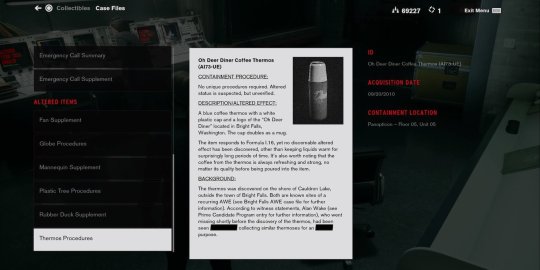
Initially, Control is its own, self-contained story, but the lore documents littered throughout the world show off the true scope of the universe at hand. Incidents involving Altered Items, Altered World Events, and Objects of Power happen all over the world, and extensive paperwork can be found all over the game world, shedding some light on these mysterious occurrences.
Fairly early on, a document can be found explaining an altered item which should look familiar to fans of Alan Wake: a coffee thermos. Players of that 2010 game surely remember the grueling optional task of collecting 100 such thermoses scattered all over the game world. Altered Items look like ordinary objects, like a cup, a floppy disk, a refrigerator, etc, but they possess unique traits that make them special, or even dangerous. This particular Altered Item, as described by the document, the aptly titled Thermos Procedures, is a blue coffee thermos whose coffee is always "refreshing and strong, no matter its quality before being poured into the item."
At first, this seems like an innocent Easter Egg meant as an acknowledgement of Remedy's past, but reading on reveals greater meaning, further connections which transcend mere fanservice. Control's Alan Wake references aren't just winks and nods; they're a full-on plot thread!

The Thermos Procedures paper is more than just an Easter Egg. The document states it was found in Bright Falls, Washington. The town is said to be the site of an Altered World Event involving a man named Alan Wake. Obviously, this is a clear reference to the events of that game, in which Alan Wake becomes embroiled in a supernatural surreal mystery, thus confirming that Alan Wake is part of the greater universe of Control.
The document has another tantalizing detail: Alan Wake was considered for the Prime Candidate Program. The story of Control shows that Prime Candidates are people whose supernatural acumen is such that they are in the running to be the Director of the Federal Bureau of Control. Dylan Faden was Candidate P6, while player character Jesse Faden (Dylan's sister) is Candidate P7. A bit of investigation in the Prime Candidate Program section of Containment reveals Alan Wake himself was considered to be a potential choice by the Bureau to be a future director, but those plans came to naught, since Wake disappeared after the Bright Falls incident. According to the report, Wake dived into Cauldron Lake and was never seen again.
The events of Alan Wake's DLC chapters and standalone expansion, Alan Wake's American Nightmare, are thus inferred to all take place within Alan's time trapped in The Dark Place at the end of the original Alan Wake. Control states that a monitoring station was established at the lake, but the lack of any documentation afterwards suggests Alan is still trapped in his mysterious limbo.
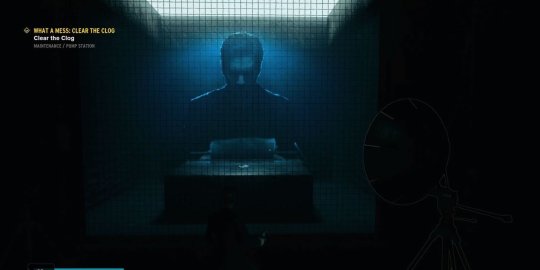
It's established early on that former Director Zachariah Trench can communicate, or at least send one way messages, to Jesse. He's dead, but his essence still exists, and is often projected into the game world, visible only to the current director, Jesse. If Alan Wake and Control exist in the same universe, there is evidence this version of the afterlife is possibly connected to The Dark Place from Alan Wake. The story of Alan Wake, among many other things, involves the title character's efforts to rescue his wife from The Dark Place. In the end, he does, but at the cost of putting himself in her stead. The game, and all its DLC, end with Alan trapped in The Dark Place.
For all the Easter Eggs and clues it's provided to lore sleuths, the Thermos Procedures document still has more to give. In addition to the aforementioned information, the provocative paper also offers up the location of the Thermos itself: Floor 05, Unit 05 of the Panopticon. This isn't just flavor text to add immersion; Jesse can actually go there. She has to use Levitation to bypass a large gap, but she can go there and find two Altered Items and a pair of documents. One Item is, of course, the thermos, but the other is far more exciting. It's a Typewritten Page, and looking at it triggers a vision of Alan Wake himself, seemingly communicating with Jesse from The Dark Place. The visuals are eerily similar to the way Trench communicates from beyond the grave.
Could Trench and Wake be in the same place? Is it somehow connected to the mysterious Astral Plane or the numerous Threshold events throughout The Oldest House? Thresholds events are described in Control as alternate dimensions seeping through into our reality, and The Dark Place of Alan Wake is referred to as a Threshold in the Bright Falls Supplement document in Control. Is the afterlife simply another dimension of existence? Or is the entire multiverse nothing but fiction made manifest through a mix of the supernatural and pure willpower?
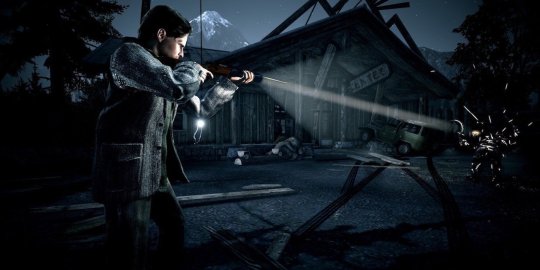
Just when things start to make sense, a new clue arises that throws everything out of whack. A common fan theory for Alan Wake was that the events of the game were all a fiction created by Thomas Zane, a poet and fantasy author. Variants on the theory suggest Alan Wake himself is a fictional creation of Zane, made real by his writing, or even vice versa, that Zane was written into existence across time and space by Alan Wake.
The audio recording found in Control, "Jesse Therapy: Polaris," possesses certain... Implications. Jesse talks about a poem by Thomas Zane, "Beyond the shadow you settle for, there is a miracle illuminated." It's a quote from Alan Wake, attributed to Zane. However, the therapist claims there is no poet named Thomas Zane. She says there was a European filmmaker who moved to the United States in the 1960s by that name, but Thomas Zane is not an accomplished writer in the universe of Control.

What does it mean? If Alan Wake and Control exist in the same universe, why isn't Thomas Zane a known entity in Control? Is Control set in a parallel universe where Zane isn't an acclaimed poet? Then where is Jesse from? Perhaps, if Zane is a figment of Alan Wake's imagination, his existence ceases to be while Wake is trapped in The Dark Place. The Therapy tape ends with a cryptic note from the doctor, who insists no progress can be made until Jesse can get a grip on "What's real and what's imagined."
But there's more. Maybe Remedy games are set in a vast multiverse, but said multiverse is based on human imagination, rather than science fiction. During optional conversations with Dylan, who has been deeply corrupted by The Hiss, he can tell Jesse of his dreams, of other realities. He talks about a figure named "Mr. Door," who shows him other realities. One, in which a writer creates stories about a cop. Another in which the cop is real. Alan Wake wrote the Alex Casey novels, stories of a hard-boiled New York City cop. Alex Casey was clearly based on Max Payne, to the point where Payne's actor, James McCaffrey (who also voiced Thomas Zane and Zachariah Trench), plays Casey in a brief cameo as a direct tribute to his role as Payne. Thomas Zane and Alan Wake are both trapped in The Dark Place. Maybe all of existence, all of the Remedy games to date, chronicle their attempts to write a scenario into existence that saves them from their unhappy fate. This is further hinted at when Dylan muses, of the various universes glimpsed in his dreams, "Maybe it's all a dream," followed by the ominous statement: "Maybe it's all real."

Remedy games are written in such a way that they have a definitive story to tell, but also a lot of grey space for fans to draw their own conclusions. Jesse and Dylan are brother and sister, but they both have unisex names and Jesse has knowledge (of Thomas Zane) that doesn't seem to exist in her universe. Are Jesse and Dylan the same person from two different universes? For this reason, is Jesse herself an Object of Power? Another of Dylan's dreams shows himself as a single person, Jesse Dylan Faden. Was Jesse Dylan somehow broken up into two people, Jesse and Dylan? By whom, and for what purpose?
Like in the best fiction, the search for definitive answers only leads to an exponential increase in questions. The lore of Control, and of the potential Remedy multiverse, is not a shallow lake, but a deep ocean. The answers aren't easy to find, if they're there at all, but it's worth diving in to experience for oneself the richness and depth of the storytelling water provided by Sam Lake and his team at Remedy. One thing's all but assured: Remedy has big plans for the future of Control and Alan Wake.
More: Control's Ending, Explained
Control is available for PC, PlayStation 4, and Xbox One.
source https://screenrant.com/control-alan-wake-universe-easter-eggs-crossover/
0 notes
Link
Coming soon to the Katharine Cornell Theater in the small town of Vineyard Haven, emeritus Harvard Law professor Alan Dershowitz will be answering questions about President Donald Trump.
Specifically, Dershowitz tells the Boston Globe, “I want to start a civil, serious dialogue on the Vineyard about the civil liberties implications of the current efforts to impeach or prosecute President Trump.”
It’s the latest twist in a bizarrely long news cycle about a well-known legal scholar’s summer vacation that touches on many of the flashpoints in American civic life today: Trump, the exceptional anti-Trump political mobilization of educated women, the ambiguous posture of the mainstream news media in the crisis, the sometimes perplexing nature of social class in contemporary America, contradictory ideas about “law and order,” and the growing substitution of celebrity grifting for actual politics.
The saga touches on many subjects of profound importance, but it began with something extremely unimportant — a Trump apologist whining about not getting invitations to dinner parties.
It all started with an op-ed in the Hill published on June 27 in which Dershowitz, like any good author, tried to promote his book by linking it to a currently hot topic of discussion.
At the time there was a lot of talk about “civility” in the context of White House press secretary Sarah Huckabee Sanders being refused service at the Red Hen restaurant in Virginia. Dershowitz, who is currently trying to get people to buy copies of The Case Against Impeaching Trump, chimed in with an op-ed about how despite not favoring impeachment, he disagrees with many of Trump’s policies.
“But that is not good enough for some of my old friends on Martha’s Vineyard,” he wrote. “For them, it is enough that what I have said about the Constitution might help Trump. So they are shunning me and trying to ban me from their social life on Martha’s Vineyard.”
This fairly unremarkable claim ended up spurring a remarkable four New York Times articles with contributions from eight reporters which, in turn, spurred a well-reported Lloyd Grove story in the Daily Beast that revealed that even Times executive editor Dean Baquet felt things had gotten out of control.
“We are trying to increase our coverage of cranky white guys,” Baquet quipped in a text to Grove. “Seriously, it’s a big place and different desks made their own plans. We should have coordinated better and done fewer.”
But rather than ending the story, Grove’s reporting if anything confirmed that the story by now had its own momentum — if a celebrity is defined as a person who is famous for being famous, Dershowitz’s social life on Martha’s Vineyard is now being covered specifically for being overcovered. Now you can find him on CNN and The View talking about Martha’s Vineyard.
[embedded content]
Those of us who’ve tried in the past to promote a book about public affairs can only gaze with wonder at Dershowitz’s stunning success here, especially because arguing that Trump should not be impeached at a time when nobody is actually trying to impeach Trump is on its face a not particularly interesting thesis.
Martha’s Vineyard is a fancy vacation spot close to the major Northeast Corridor population centers. Consequently, it’s so well-known to the people who run the major media outlets in America that stories that take place in or around it have often been covered as if the typical person knows what Martha’s Vineyard is. (Realistically, people might wrongly assume it has something to do with wine production and/or Martha Stewart.)
In reality, Martha’s Vineyard an island south of Cape Cod in Massachusetts whose geography makes it an isolated getaway (you can’t drive there after all) that is also reasonably close to the most densely populated portion of the country.
Historically, Martha’s Vineyard was a center of the American whaling industry (the harpooner Tashtego from Moby Dick was from Martha’s Vineyard), which is why the preppy apparel brand Vineyard Vines uses a lot of whale iconography. In the 19th century, a quirk of population genetics gave rise to a large deaf population on the island, many of whom (along with many hearing islanders) used a distinctive Martha’s Vineyard Sign Language.
The widespread deployment of railroads and especially the rise of the automobile, however, greatly changed the economic geography of the East Coast’s off-shore islands. At a time when water-based travel was generally faster than land-based travel, islands were not particularly isolated from other coastal communities. Automobiles inverted that logic, and rapidly turned places like Martha’s Vineyard into essentially specialized vacation communities that made a virtue out of their relative isolation from the hustle and bustle of the Northeast Corridor.
All the various Northeast summering spots have a fair amount in common, but the Vineyard does distinguish itself in several ways. For starters, the town of Oak Bluffs has long specifically been the vacation destination of choice for African-American elites on the East Coast. Secondarily, as an island the Vineyard leans in the direction of being a tight-knit community with defined edges.
The heavy presence of academics among Greater Boston’s social elite and the relative paucity of truly super-duper rich people compared to New York also means that the Vineyard has a distinctly tweedier, less flashy vibe than, say, the Hamptons. This in turn makes it a good getaway spot for celebrities who prefer to stay out of the public eye, and both Bill Clinton and Barack Obama enjoyed the ability to vacation there in a low-key manner.
None of this is super relevant to the story, except to say that between the relative diversity, the association with Democratic Party presidents, and the disproportionate academic population, Martha’s Vineyard is more uniformly liberal in its politics than other places Dershowitz might have chosen to go on vacation. It’s also the kind of place that lots of journalists might like to go on vacation, which helps explain the media coverage.
There have been a lot of stories lately about the impact of Donald Trump’s trade policies on the lobster industry in Maine. While this is unquestionably an important story in its own right, as a person whose family has long owned a summer house on the Maine coast, I can’t help but notice that the East Coast media’s level of interest in the economic well-being of seaside Maine towns invariably seems to skyrocket in the summertime.
In a practical sense, the off-season would be a much better time to do this reporting since lodging would be considerably cheaper and a reporter could be confident that almost everyone he encounters is a bona fide local. But from the standpoint of wanting to get a little work done while on vacation, wanting to get work to pay for you to go on vacation, or simply spending or week or two “working from home” while remote in a scenic location, it’s better to report from Maine in the summertime.
Something similar, I strongly suspect, was at work in the overwhelming enthusiasm Times reporters exhibited for following up on Dershowitz’s social life.
To this one might add that while the question of which dinner parties Alan Dershowitz does and does not get invited to is fundamentally uninteresting, Dershowitz’s political trajectory over the years actually is pretty interesting.
Dershowitz began his career as a very typical — albeit unusually successful — liberal legal academic, clerking for the chief judge of the DC Circuit and then for Supreme Court Justice Arthur Goldberg before joining the faculty of Harvard Law School in 1964 and becoming the school’s youngest-ever full professor at the age of 28 in 1968. Though primarily an academic, he did dabble in litigation work, including the successful 1976 appellate defense of Deep Throat star Harry Reems.
In 1984, Dershowitz became a legal celebrity thanks to his successful representation of British socialite Claus von Bülow, who’d been convicted of the attempted murder of his wife, Sunny von Bülow, who had fallen into a coma. Dershowitz got the conviction overturned on appeal, Bülow was acquitted in a retrial, Dershowitz wrote a successful book about the case, and the book was adapted into a very good 1990 film, Reversal of Fortune, that earned several Oscar nominations.
One particularly charming detail of the story, as told by Dershowitz, is that he was initially reluctant to take the case, believing Bülow to be guilty. But Dershowitz agreed to take Bülow on as a client when he agreed to also finance the defense of two African-American teenagers facing death penalty murder charges.
This kind of upstairs/downstairs class dynamic, where the famous law professor serves as an advocate for privileged clients while making the case that he is serving the core interests of the underprivileged, is at the core of a lot of Dershowitz’s most noteworthy legal work.
He served, for example, as an appellate adviser for O.J. Simpson’s legal team during the former football star’s murder trial. The Simpson defense team managed to use the considerable resources at its disposal to successfully wield the black community’s longstanding grievances with police and prosecutorial misconduct into an acquittal for their client without really accomplishing much of anything for less famous members of the community.
By the same token, Dershowitz insists he’s not defending Trump because he’s suddenly become a right-winger — he’s doing so because as a longtime progressive civil libertarian he’s concerned about prosecutorial overreach and the FBI running amok to persecute an enemy. The larger political context in which Trump is governing as the least civil libertarian president in a generation, mobilizing and implementing a massive political and cultural backlash to the Black Lives Matter movement, is not interesting to Dershowitz. So while the Trump advocacy is a bit of a new posture for Dershowitz it is, on another level, entirely consistent with the broader trajectory of his career, which has always been more focused on exonerating individual high-profile clients than on systemic reform.
Meanwhile, separately from his main academic work Dershowitz has over the past 15 years been increasingly involved in pro-Israel advocacy, writing The Case for Israel in 2003 and The Case Against the Iran Deal in 2015. For a liberal Democrat to also have stridently hawkish views on Israel was not uncommon in the recent past, but the sands have been shifting on this issue.
Dershowitz supported Hillary Clinton over Barack Obama in the 2008 Democratic primary campaign in part over Israel-related issues, and Israel became a much more party-polarized topic during Obama’s administration with Democrats shifting to the left even as Israeli politics has shifted well to the right. Meanwhile, Israel’s prime minister, Benjamin Netanyahu, has been openly supportive of Republicans.
The point, however, is that when Dershowitz tells his Vineyard friends that they — rather than he — are the ones who have changed, he has a point. And that includes the fact that, fundamentally, he’s just a guy out there doing a good job of promoting a quickie book.
The really crucial point in all of this is that while Dershowitz would like you to think that we are talking about his social life because he is being shunned over his pro-Trump book, the truth is the opposite — we are talking about alleged shunning (or lack thereof) because he is out promoting a book.
Dershowitz writes a lot of books — indeed, The Case Against Impeaching Trump is his second book of 2018, following February’s release of The Case Against BDS — and he is a shrewd self-promoter. His impeachment book is on an interesting subject, but it suffers from several fundamental problems.
First and foremost, nobody is really trying to impeach Trump! Democratic congressional challengers aren’t running on impeachment, Democratic congressional leaders say the impeachment issue is a “gift to Republicans,” none of the incumbent Senate Democrats in tough reelection battles favor impeachment, and it’s overall a nonissue.
Secondarily, while the possibility of impeachment is obviously a subject of Robert Mueller’s ongoing investigation, that investigation is not complete and Mueller himself has said almost nothing about it. Depending on what Mueller finds, it’s certainly possible that support for impeachment will grow (maybe even Dershowitz will be convinced). But it’s also entirely possible that Mueller will bring charges against a few more Trump associates and ultimately conclude that the president personally didn’t do anything wrong, and the currently very low levels of political support for impeachment will go even lower.
Whether or not to impeach Trump is not really a live issue in American politics this summer. What is very much on the agenda is how college-educated liberals who feel viscerally that Trump is much worse than the average Republican should react to Trump supporters they encounter socially.
Stories about Sanders’s trip to the Red Hen, White House adviser Stephen Miller’s misadventures in take-out sushi, and other day-to-day acts of civic disrespect for Trump figures have been widely trafficked and widely debated despite a lack of obvious significance. Among other things, even in a social circle where nobody would actually defend Trump on the merits, it’s easy to reach an equilibrium where reasonable people can disagree about exactly how much shunning of Trump supporters one should engage in.
By linking his book directly to a live controversy, Dershowitz has managed to secure oodles of coverage and sell books. And I, frankly, can only admire him for it.
Original Source -> The bizarre media hoopla over Alan Dershowitz’s social life in Martha’s Vineyard, explained
via The Conservative Brief
0 notes